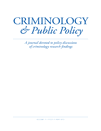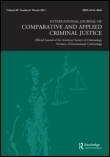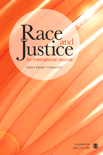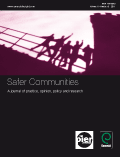
Salus Journal
Scope & Guideline
Empowering Research for a Healthier Tomorrow
Introduction
Aims and Scopes
- Policing Practices and Innovations:
The journal emphasizes cutting-edge research on policing methodologies, including innovative training approaches, community policing, and the integration of technology in law enforcement. - Criminal Justice System Analysis:
It provides insights into the functioning and challenges of criminal justice systems, exploring topics such as corruption, capacity building, and the legal frameworks governing police actions. - Crime Trends and Victimology:
The journal investigates various crime trends, including organized crime, homicide rates, and the impact of socio-economic factors on crime, with a focus on victimological perspectives. - Terrorism and Security Studies:
Research published in the journal often addresses issues of terrorism, counter-terrorism strategies, and the implications of security policies on civil society. - Social Justice and Community Impact:
The Salus Journal engages with themes of social justice, examining the intersection of crime, community dynamics, and the role of policing in fostering or hindering community trust.
Trending and Emerging
- Impact of Technology on Policing:
The incorporation of technology in policing practices, such as the use of computer surveillance and data analytics, is increasingly emphasized, highlighting its relevance in modern law enforcement. - Responses to Contemporary Crises:
The journal is focusing more on the police response to contemporary crises, such as the COVID-19 pandemic, reflecting a growing interest in how law enforcement adapts to global challenges. - Community and Social Justice Issues:
There is a noticeable trend towards exploring the intersection of crime, community impact, and social justice, emphasizing the need for police practices that build trust and legitimacy within communities. - Terrorism and Radicalization:
Research on terrorism, especially regarding financing and radicalization, is gaining traction, indicating a heightened concern over national and global security issues. - Mental Health and Law Enforcement:
Emerging discussions on the mental health of law enforcement officers and their interactions with individuals experiencing mental health crises are becoming more prominent, recognizing the complexities of policing in this area.
Declining or Waning
- Historical Policing Practices:
Research that focuses on historical analyses of policing practices, such as the study of serial homicide cases over extended periods, is becoming less frequent, indicating a possible waning interest in historical perspectives. - Broad Theoretical Discussions on Crime:
Papers that engage in broad theoretical discussions without empirical backing, particularly those that do not focus on contemporary issues or case studies, are appearing less frequently in recent volumes. - General Crime Statistics Reporting:
The trend of publishing generalized crime statistics reports has decreased, as there is a shift towards more nuanced analyses of specific crime types and their socio-legal implications.
Similar Journals

Criminology & Public Policy
Illuminating Paths to Effective Public PolicyCriminology & Public Policy, published by Wiley, is an esteemed journal that plays a pivotal role in the interdisciplinary fields of law, public administration, and literature. With a focus on innovation and empirical research, this journal addresses critical issues surrounding crime and justice while influencing policy decisions globally. The journal boasts a prestigious impact factor, reflecting its significant contribution to academic discourse, particularly noted for its top quartile rankings in the fields of Law, Literature and Literary Theory, and Public Administration in 2023. As a resource for researchers, practitioners, and policymakers, Criminology & Public Policy aims to bridge the gap between theory and practical application, presenting cutting-edge analyses and insights that are vital for addressing contemporary societal challenges. By providing a platform for rigorous scholarship, this journal supports the advancement of knowledge and fosters informed discussions that shape effective public policies.

International Journal of Comparative and Applied Criminal Justice
Innovating research for impactful justice solutions.International Journal of Comparative and Applied Criminal Justice, published by ROUTLEDGE JOURNALS, TAYLOR & FRANCIS LTD, stands at the forefront of interdisciplinary research in the fields of law, sociology, and social psychology. With an ISSN of 0192-4036 and an E-ISSN of 2157-6475, this esteemed journal has been disseminating pivotal research since its inception in 1977. Recognized for its rigorous scholarship, it boasts a Q1 ranking in Law and positions itself within the top 85th percentile in Social Sciences - Law, emphasizing its impact on the academic community. Although primarily subscription-based, its accessibility ensures that critical findings reach a wide audience, supporting the advancement of knowledge across various disciplines. The journal's scope encompasses significant developments in applied criminal justice, making it an invaluable resource for researchers, policymakers, and students dedicated to understanding and improving justice systems globally. In its commitment to academic excellence, the journal continues to foster innovative dialogue and promote knowledge exchange, contributing significantly to current debates within the social sciences.

American Journal of Criminal Justice
Exploring Innovative Solutions in Law and JusticeAmerican Journal of Criminal Justice is an esteemed publication within the realm of law and criminal justice, recognized for its significant contributions to the understanding and advancement of this vital field. Published by Springer, the journal has established itself as a leading platform for rigorous academic research and scholarly discourse since its inception in 1975. With its impressive 2023 Q1 ranking in the Law category and its 98th percentile ranking in Scopus among social sciences, the journal showcases cutting-edge research that addresses pivotal issues in criminal justice. Though it does not offer open access, its wealth of content is accessible to academic institutions and professionals seeking to deepen their knowledge. The journal aims to foster interdisciplinary collaboration and to provide a forum for innovative methodologies, policy evaluations, and theoretical perspectives, making it a critical resource for researchers, practitioners, and students dedicated to the evolution of criminal justice.

Race and Justice
Pioneering research at the crossroads of race and justice.Race and Justice is an esteemed academic journal published by SAGE Publications Inc, dedicated to advancing the discourse surrounding race and its complexities within the realms of justice, law, and sociopolitical dynamics. With its ISSN 2153-3687, the journal has positioned itself prominently in the Q1 category across multiple disciplines, including Anthropology, Law, and Sociology and Political Science. Since its inception in 2011, Race and Justice has become a vital resource for researchers, professionals, and students, offering rigorous peer-reviewed articles that explore critical issues related to race and systemic justice. It boasts impressive Scopus rankings, placing it in the 96th percentile for Anthropology and the 95th percentile for Law, highlighting its significant impact in the social sciences. This journal not only fosters scholarly inquiry but also encourages critical dialogue on the implications of racial issues in the justice system. Although it is not an open-access journal, its comprehensive scope and high standards make it indispensable for anyone engaged in the study of race and justice.

Women & Criminal Justice
Highlighting Women's Roles in the Justice SystemWomen & Criminal Justice, published by Routledge Journals, Taylor & Francis Ltd, stands as a prominent platform for scholarly discourse in the intertwined realms of gender studies and legal research. Since its inception in 1989, this journal has been pivotal in addressing the unique challenges and perspectives of women within the criminal justice system, making substantial contributions to the field. With a commendable impact factor reflected in its Q1 ranking in Law and Q2 ranking in Gender Studies, it offers both researchers and practitioners rigorous and insightful analyses. The journal covers a wide spectrum of topics, aligning contemporary issues with legal frameworks, while advocating for a nuanced understanding of gender-related injustices. Though it operates under a traditional access model, its invaluable insights foster essential discussions among academics, policymakers, and social advocates. By engaging with themes of societal crime, victimization, and justice reform, Women & Criminal Justice continues to underscore the importance of integrating gender awareness into legal scholarship and practice, thereby enriching the broader academic community.

Revista Criminalidad
Pioneering Academic Discourse on CrimeRevista Criminalidad, published by POLICIA NAC COLOMBIA, is a distinguished academic journal that has been open access since 1958, making critical research in the field of criminology readily available to the global scholarly community. Based in Colombia, this journal serves as a prominent platform for the dissemination of high-quality research on crime, law, and social sciences. Notably categorized in various quartiles for 2023, including Q2 in Arts and Humanities (miscellaneous) and Q3 in Law, it holds respectable rankings in the Scopus database, reflecting its significance and contribution to both academic and practical discourse. The journal invites researchers, professionals, and students to explore its comprehensive scope, spanning vital themes relevant to criminology and public safety, making it an essential resource for those invested in the interplay between society, law, and criminal behavior. For up-to-date research and insights, the journal is accessible at the CENTRO INVESTIGACIONES CRIMINOLOGICAS DIJIN, AVE EL DORADO 75-25, BOGOTA.

Crime and Justice-A Review of Research
Exploring the complexities of crime through research.Crime and Justice: A Review of Research is a leading scholarly journal published by the University of Chicago Press, dedicated to advancing knowledge in the fields of sociology and political science, specifically through the lens of crime and justice studies. With an ISSN of 0192-3234 and an E-ISSN of 2153-0416, this academic journal offers a distinguished platform for researchers, practitioners, and students to explore contemporary issues, methodologies, and theoretical advancements within the domain. Ranked in the Q2 category for both sociology and political science as of 2023, it has gained recognition with an impressive Scopus rank of #150 out of 1466 in its field, placing it in the 89th percentile. The journal publishes comprehensive reviews and research articles that inform best practices and policies in crime prevention, law enforcement, and social justice, fostering a deeper understanding of the complexities surrounding crime and societal responses. Though it is not an open-access journal, the insightful research it presents is indispensable for academic discourse and practical application in addressing the multifaceted challenges of crime and justice in contemporary society.

Safer Communities
Exploring the nexus of law, health, and community safety.Safer Communities is a distinguished academic journal published by Emerald Group Publishing Ltd, focusing on the intersections of community safety, law, public health, and safety research. Since its inception in 2002, this journal has offered a platform for rigorous empirical studies, theoretical discussions, and insightful reviews that aim to enhance safety standards and practices globally. With an impressive Scopus ranking in various categories, including Law and Community and Home Care, the journal consistently demonstrates its relevance and critical contribution to these multidisciplinary fields. Operating within the United Kingdom, Safer Communities invites contributions that address contemporary issues affecting community safety, making it a vital resource for researchers, practitioners, and students alike. The journal is committed to fostering accessible, high-quality research without the limitations of open access, thus serving a wide audience eager to advance their understanding of safety dynamics in various contexts. With its ongoing commitment to academic excellence and community engagement, Safer Communities remains a pivotal journal for those dedicated to enhancing societal safety and well-being.

Journal of Criminal Psychology
Bridging the gap between psychology and criminal law for societal impact.Journal of Criminal Psychology, an esteemed publication by EMERALD GROUP PUBLISHING LTD, serves as a pivotal resource in the interdisciplinary study of criminal behavior through the lenses of psychology and law. Since its inception in 2011, this journal has significantly contributed to the understanding of psychological principles as they apply to crime, law enforcement, and social justice, making it a vital source for both researchers and practitioners. With a commendable ranking of Q1 in Law and Q3 in Applied and Social Psychology for 2023, the journal guarantees high-quality research findings that can influence policy and practice across these domains. Although it does not offer open access, its rigorous peer-review process ensures that every published article adheres to the highest academic standards. The Journal of Criminal Psychology not only fosters academic discourse but also drives innovation in criminal justice practices, making it essential reading for anyone dedicated to the enhancement of ethical standards in legislation and law enforcement.

Asian Journal of Criminology
Pioneering Research for a Safer Asian SocietyAsian Journal of Criminology, published by SPRINGER, stands as a pivotal platform for scholarly communication within the field of criminology, boasting a notable impact factor and achieving a distinguished Q1 ranking in Law for 2023. Located in the Netherlands, this journal addresses the complexities of crime and justice in Asian contexts, fostering interdisciplinary discourse between researchers, practitioners, and policymakers. Since its inception in 2006 and continuing through to 2024, the journal has published a range of high-quality articles that explore theoretical frameworks, empirical research, and practical applications in criminology. Although the journal is not open access, it remains accessible through academic libraries and institutions, ensuring its wide reach among scholars and students. With a Scopus ranking of 143 out of 1025 in the field of Social Sciences Law, placing it in the 86th percentile, the Asian Journal of Criminology is essential for anyone looking to stay at the forefront of criminological research and its application in diverse societal contexts.